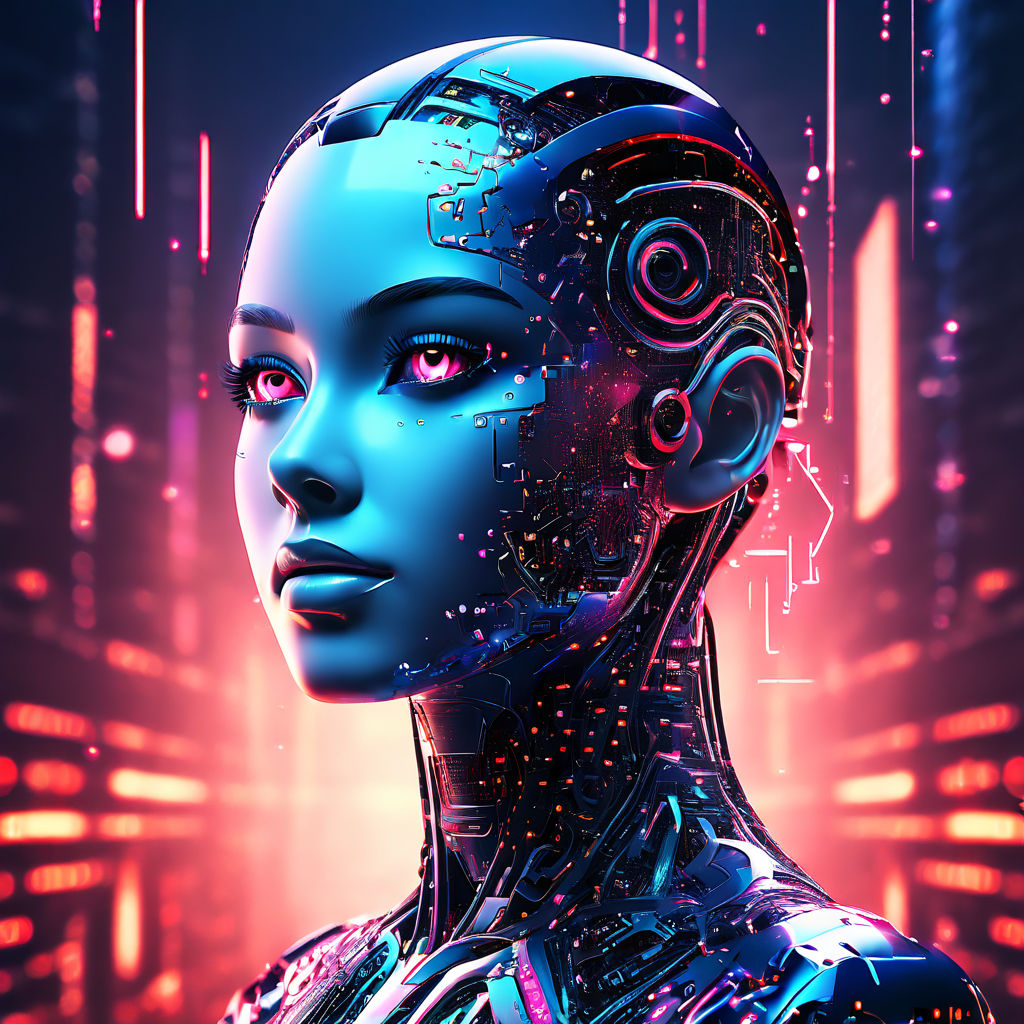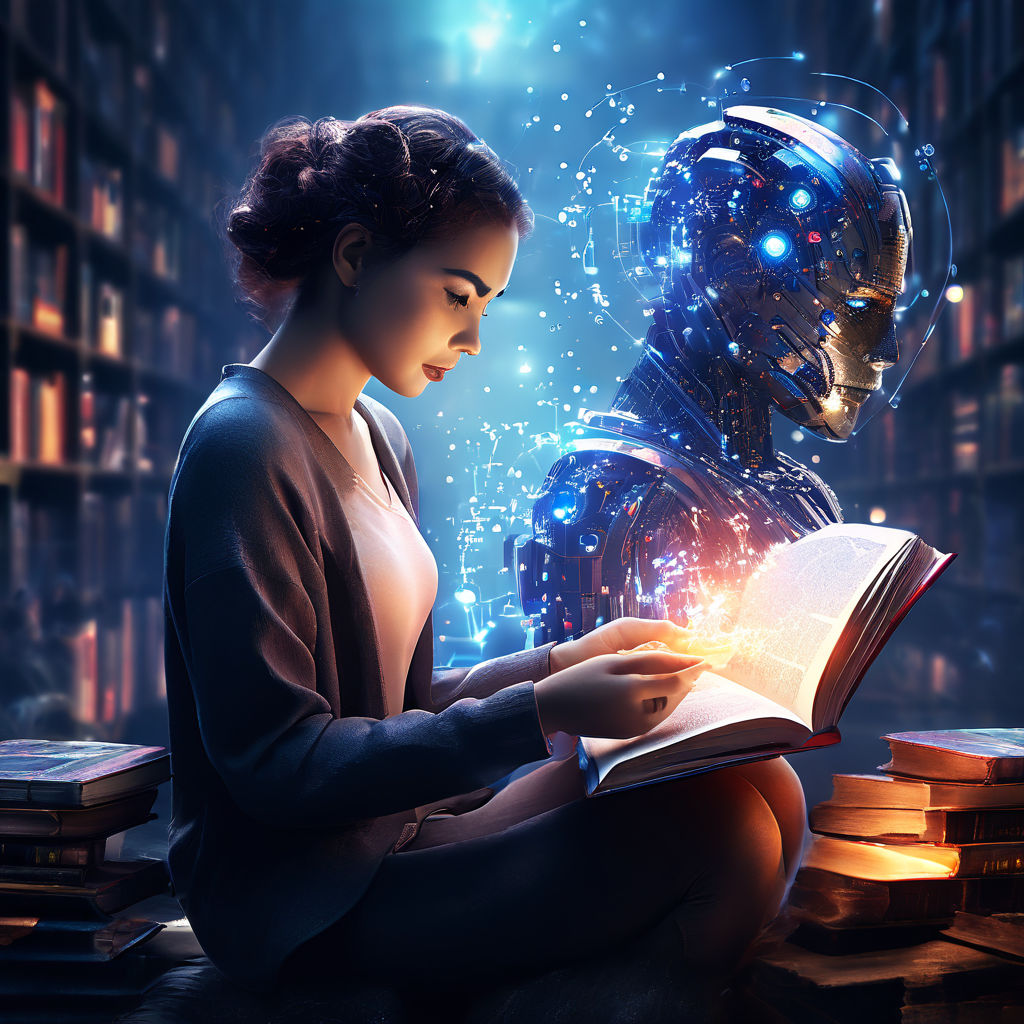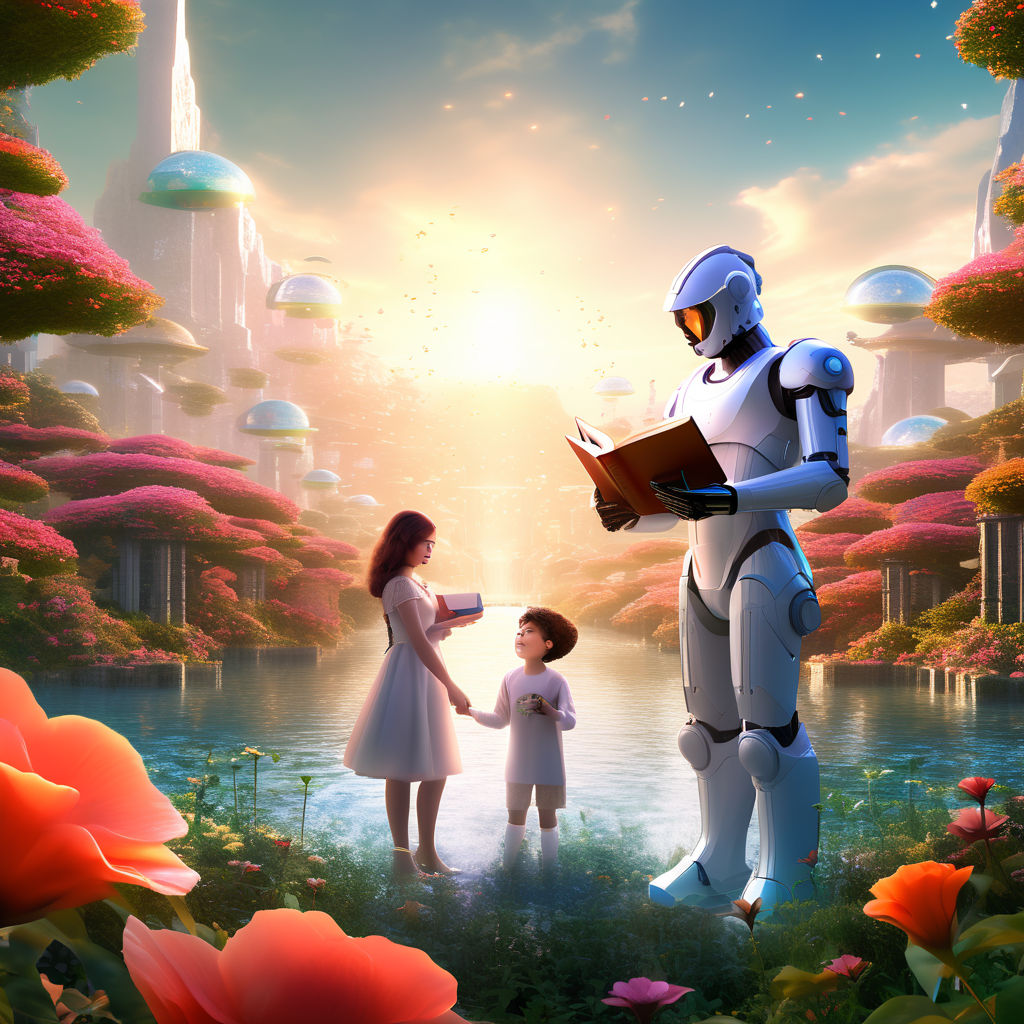
The pages may still rustle, and the ink may still dry, but the literary landscape is undergoing a subtle transformation in 2024.
In a time where technology seems to evolve in the blink of an eye, the world of literature might appear comparatively static, a haven of tradition amidst a sea of change. But beneath the familiar scent of old tomes and the rhythmic rustle of turning pages, an intriguing collaboration is taking root. Artificial intelligence (AI), once relegated to the realm of science fiction, is now subtly infiltrating the author’s toolkit and influencing the reading experience in 2024. Come with me and see how AI is shaping the future of literature in 2024.
This burgeoning partnership between human ingenuity and machine intelligence begs exploration, urging us to delve into its potential to revolutionize storytelling, empower creators, and redefine the way we encounter narratives. While whispers of apprehension may linger, the future of literature appears poised for an exciting metamorphosis, one fueled by the interplay between the human heart and the ever-evolving mind of AI. As we embark on this uncharted territory, it’s crucial to ask: how exactly is AI reshaping the landscape of literature? What are the potential benefits and challenges associated with this unique partnership? And ultimately, where will this collaboration lead us in the ever-evolving narrative of human expression?
Let us all welcome AI and appreciate its performance
Table of Contents
ToggleRobots & Rhyme: How AI is Shaping the Future of Literature in 2024
The world of literature, long considered a bastion of human creativity and expression, is undergoing a fascinating transformation in 2024. Artificial intelligence (AI), once confined to the pages of science fiction, is now stepping cautiously into the author’s domain, blurring the lines between human and machine-generated narratives. This burgeoning relationship raises intriguing questions about the future of storytelling and its impact on both writers and readers.
AI’s Penmanship: Exploring the Rise of AI-Generated Literature
One of the most captivating aspects of AI’s influence on literature is the emergence of AI-generated content. From creating character profiles and dialogue snippets to crafting entire short stories and poems, AI algorithms are learning to mimic human writing styles and generate surprisingly coherent and even creative content. This has sparked the rise of “co-authored” works, where humans and AI collaborate on narrative development, with AI providing prompts, suggestions, and even complete sections of text. While the quality and artistic merit of these AI-generated works are still debated, they undeniably showcase the potential of AI to become a valuable tool for writers, assisting them in exploring different creative avenues, and even generating new ideas.
Human-AI Collaboration: Assisting Authors and Transforming the Writing Process
Beyond generating content, Artificial intelligence is also transforming the writing process in a multitude of ways. Advanced grammar and plagiarism checkers are becoming more sophisticated, helping authors polish their work and ensure originality. AI-powered research tools can gather information and statistics, saving authors valuable time and effort. Additionally, AI-based writing assistants are emerging, offering real-time feedback on sentence structure, word choice, and overall flow, acting as a virtual editor and sounding board for writers. This collaborative approach, where AI complements and enhances human creativity, holds immense potential to improve the efficiency and effectiveness of the writing process
In a time where technology seems to evolve in the blink of an eye, the world of literature might appear comparatively static, a haven of tradition amidst a sea of change. But beneath the familiar scent of old tomes and the rhythmic rustle of turning pages, an intriguing collaboration is taking root. Artificial intelligence (AI), once relegated to the realm of science fiction, is now subtly infiltrating the author’s toolkit and influencing the reading experience in 2024.
This burgeoning partnership between human ingenuity and machine intelligence begs exploration, urging us to delve into its potential to revolutionize storytelling, empower creators, and redefine the way we encounter narratives. While whispers of apprehension may linger, the future of literature appears poised for an exciting metamorphosis, one fueled by the interplay between the human heart and the ever-evolving mind of AI. As we embark on this uncharted territory, it’s crucial to ask: how exactly is AI reshaping the landscape of literature? What are the potential benefits and challenges associated with this unique partnership? And ultimately, where will this collaboration lead us in the ever-evolving narrative of human expression?

The Future of Reading in 2024: How AI is Affecting Readers and Book Recommendations
The impact of AI extends beyond the realm of writing and into the reading experience as well. AI-powered recommendation algorithms are becoming increasingly adept at suggesting personalized reading lists based on a reader’s past preferences and interests. This can be a boon for readers looking to discover new and exciting books, as AI can delve deeper into the vast ocean of literature, identifying hidden gems and niche genres that might have otherwise gone unnoticed. Additionally, AI-powered chatbots and virtual assistants are being developed to answer reader questions about characters, plot points, and historical context, potentially enhancing reader comprehension and engagement with the text.
Challenges and Considerations: Navigating the Uncharted Territory
While the potential benefits of AI in literature are undeniable, some important challenges and considerations need to be addressed. Concerns regarding potential job displacement for writers, copyright issues surrounding AI-generated content, and the potential homogenization of writing styles due to AI influence are all valid discussions that need to be had. Additionally, the ethical implications of AI-generated narratives and the potential for manipulation or the spread of misinformation also require careful consideration.
Unlocking Creative Potential:
For human authors, AI offers a multitude of benefits for the future of literature in 2024. It can help overcome writer’s block by providing prompts and suggestions, sparking new ideas and unexpected plot twists. AI can also assist in world-building by generating detailed descriptions of settings and characters, enriching the overall narrative tapestry. Additionally, AI writing partners can offer real-time feedback on style, grammar, and word choice, acting as a valuable sounding board for authors as they refine their work.
Beyond the Hype: Quality and Ethical Considerations:
The quality and artistic merit of AI-generated literature remains a subject of debate. While some argue that AI-produced content lacks the emotional depth and unique human perspective essential for truly compelling narratives, others see the potential for AI to create innovative and genre-bending works. Regardless of the current artistic merit, the rapid evolution of AI suggests that the quality and sophistication of its literary output will continue to improve.
However, alongside the potential benefits, ethical considerations surrounding AI-generated literature demand careful attention. Issues of copyright and ownership need to be addressed as the lines between human and machine-generated content blur. Additionally, the potential for AI to create biased or misleading narratives, particularly in the context of sensitive topics, necessitates responsible development and implementation practices.
The Future of AI in Literature:
As AI technology continues to develop, its role in literature is likely to become even more prominent. While AI is not about replacing human authors, it presents an opportunity for them to explore new creative avenues, experiment with different styles, and potentially reach wider audiences through AI-powered recommendation tools. The future of literature will likely be shaped by a collaborative approach, where AI complements and enhances human creativity, fostering a dynamic and ever-evolving literary landscape.
Looking Forward:
The rise of AI-generated literature in 2024 is a testament to the ongoing evolution of storytelling in the digital age. While questions and challenges remain, this development also presents exciting possibilities for the future of literature. By fostering responsible innovation and a collaborative spirit, we can ensure that AI becomes a valuable tool for enriching both the creative process and the reading experience, ushering in a new era of literary exploration and expression.

How AI is Assisting Authors and Transforming the Writing Process (2024)
The world of literature has long been considered a domain of human creativity and expression. However, in 2024, a fascinating collaboration is emerging, one that blurs the lines between traditional authorship and the capabilities of artificial intelligence (AI). This collaboration is transforming the writing process in ways never imagined before, offering both exciting possibilities and important considerations for authors and the literary landscape as a whole.
Beyond Grammar and Spelling: AI as a Creative Partner
AI’s role in writing goes far beyond the basic functionalities of grammar and spell checks. In 2024, we are witnessing the rise of AI tools that act as creative partners, assisting authors in various aspects of the writing process:
World-Building:
Need a detailed description of a fantastical landscape or an alien civilization? AI can generate intricate descriptions, enriching the setting and immersing readers in the narrative.
Character Development:
From crafting backstories and personalities to generating dialogue options, AI can help authors flesh out their characters, making them feel more real and relatable.
Real-time Feedback:
AI-powered writing assistants can analyze an author’s work in real time, offering suggestions on sentence structure, word choice, and overall flow. This constant feedback loop helps authors refine their writing and improve their craft.
The Future of Storytelling: A Symphony of Human and Machine
The future of storytelling in 2024 and beyond lies in a beautiful symphony of human creativity and machine intelligence. Authors who embrace AI as a valuable partner, leveraging its strengths while retaining their unique perspective, will be best positioned to thrive in this evolving landscape. This collaboration has the potential to push the boundaries of storytelling, fostering innovation, and enriching the reading experience for audiences worldwide.
Ultimately, this human-AI collaboration marks a pivotal moment in the history of writing. By fostering responsible innovation, engaging in open and honest dialogues, and embracing the unique strengths of both humans and machines, we can ensure that literature continues to flourish, captivating readers and inspiring generations to come.
The Future of Reading:
As technology continues to weave itself more deeply into the fabric of our lives, its impact on our reading habits is becoming increasingly evident. In 2024, artificial intelligence (AI) is poised to play a significant role in shaping the future of reading, affecting both how readers discover new books and how they engage with them.
Revolutionizing Recommendations: AI as Your Personal Book Butler
One of the most noticeable ways AI is influencing the reading experience is through its role in book recommendations. Gone are the days of relying solely on friends’ suggestions or browsing physical bookstores. AI-powered recommendation algorithms are rapidly evolving, providing readers with a personalized and data-driven approach to book discovery.
These algorithms analyze a reader’s past reading history, including preferred genres, authors, and reading habits. They then leverage this data to curate personalized recommendations, suggesting books that align with the reader’s interests and preferences. This can be particularly beneficial for readers who struggle to find new and captivating books or who are looking to explore new genres outside their usual comfort zone.
Beyond Recommendations: AI-powered Enhancements
The influence of AI goes beyond suggesting books. AI-powered tools are also emerging to enhance the reading experience itself. These tools include:
Interactive annotations and character profiles:
AI can provide access to interactive annotations and character profiles, offering insightful information about the story, historical context, and individual characters. This can deepen a reader’s understanding and appreciation of the narrative.
Text-to-speech conversion:
AI can convert written text into audio format, allowing readers to enjoy audiobooks or listen to excerpts while commuting, exercising, or performing other activities. This can be particularly beneficial for individuals who have visual impairments or who simply prefer an auditory reading experience.
Language translation:
AI-powered translation tools are becoming increasingly sophisticated, allowing readers to access books in languages they may not understand fluently. This opens up a world of literary possibilities, fostering intercultural understanding and broadening the landscape of available reading material.
Challenges and Considerations in the Evolving Literary Landscape
While AI presents exciting possibilities for the future of reading, there are also important considerations to keep in mind:
Echo chambers and filter bubbles:
AI algorithms can inadvertently create echo chambers by recommending books that reinforce existing preferences and viewpoints. It is crucial to be aware of this potential bias and actively seek diverse recommendations to ensure exposure to a broader range of perspectives.
Overreliance on technology:
While AI can be a valuable tool in enhancing reading experiences, it is important not to rely solely on technology for book discovery. Engaging with book reviewers, attending author talks, and exploring different bookstores can still play a significant role in enriching the reading journey.
Data privacy concerns:
As AI algorithms rely on collecting and analyzing personal data, ensuring data privacy and using ethical practices in data collection remains crucial.

Conclusion: A Tapestry Woven with Ink and Algorithms
As the ink bleeds onto the page and the algorithms whir to life, the future of literature in 2024 unfolds like a captivating story still being written. This is not a tale of human obsolescence, but of a harmonious collaboration, where the spark of human creativity ignites the potential of AI, and the cold logic of machines refines the emotional depth of human expression. The symphony of human and machine promises to weave a tapestry of narratives richer, more diverse, and more accessible than ever before. As readers delve into these new literary landscapes, it is not just the stories that will be transformed, but the very act of reading itself. So, let us turn the page, embrace the possibilities, and witness the evolution of storytelling in this exciting new chapter.

This blog is a great mix of informative and entertaining content It keeps me engaged and interested from start to finish